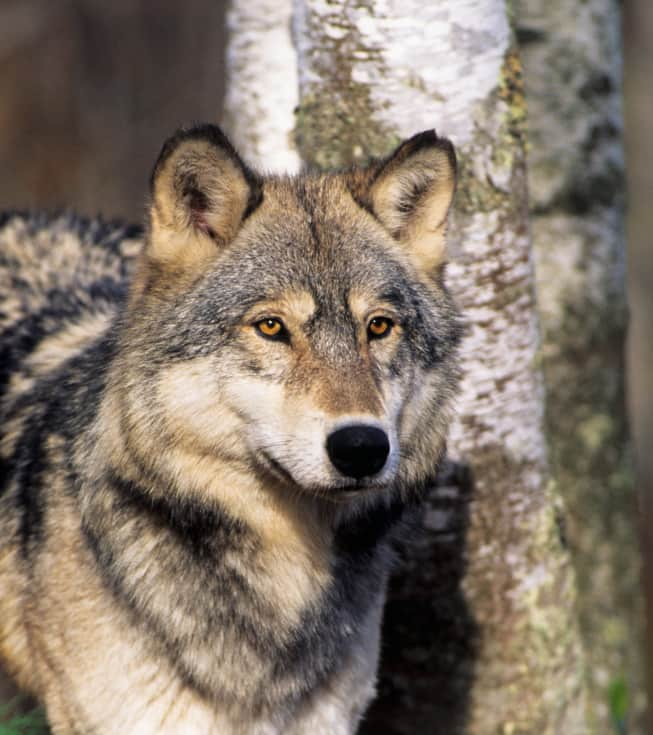Michigan Wolf Season Potentially Put on Hold
OutdoorHub Reporters 05.24.13

Shortly after Michigan Governor Rick Snyder signed legislation allowing the state’s Department of Natural Resources (DNR) more power over designating game animals, the department approved a fall gray wolf hunt in the Upper Peninsula. The wolf management hunt would begin on November 15 and run through to December 31 or until the quota has been reached.
That season is now potentially put on hold due to a petition by the animal activist group Keep Michigan Wolves Protected (KMWP). The petition was signed by over 255,000 state residents, which more than exceeded the minimum 151,305 signatures needed to get an issue on the 2014 ballot. According to The Detroit News, the season is now postponed pending a referendum vote in November of next year.
However, Public Act 21 of 2013, the bill that Governor Snyder had signed into law earlier this month, allowed the state’s Natural Resources Commission to approve game species without interference from referendums. The commission could simply propose adding the gray wolf to its list of game species during its June meeting and finalize the decision by July.
“The wolf hunt is only suspended temporarily,” DNR UP Regional Supervisor Terry Minzey told OutdoorHub. “In June of 2013 the NRC will receive information for consideration and then in July will name the game species of Michigan. The gray wolf will be one of those. At the same time they will receive an order to establish a wolf season. The concept that the hunt is suspended, while technically true, is only a minor hiccup. We will move forward with the hunt as originally scheduled.”
Animal activists have decried Act 21 as a move to block voter input. The law received significant criticism when it was introduced earlier this year.
“Following the submission of more than 255,000 signatures, the Board of State Canvassers upheld its responsibility to the people of Michigan by certifying our petition drive to place the wolf hunting referendum on the November 2014 ballot,” said Jill Fritz, director of KMWP, in a press release. “How will Gov. Snyder, the legislature and NRC explain to Michigan’s 7.2 million registered voters that wolves are being needlessly slaughtered and their votes won’t count? We will continue our tireless struggle to stop wolf hunting and trapping in Michigan and fight for the return of the democratic process for voters.”
Opponents of the wolf hunt say that Michigan’s wolf population, estimated at over 650, is still in the process of recovering from widespread depopulation since the early 1900s. Wildlife officials believe that the species has bounced back significantly and proposes population control through a management hunt, while farmers say that attacks on cattle have increased in recent years. The proposed quota of 43 animals is roughly 6.5 percent of the state’s overall wolf population.
“These bills protect the rights of hunters, anglers, and trappers, and ensure that wildlife management decisions are based on the recommendations of biologists, not out-of-state anti-hunters,” said Erin McDonough, executive director of Michigan United Conservation Clubs (MUCC). MUCC has long advocated for a wolf management season to control the species and limit conflicts with humans. Wolves can be not only dangerous to livestock, but smaller animals as well.
“Our members have lost dogs and pets to wolves,” said Joe Hudson, president of the Upper Peninsula Bear Houndsmen Association. “We’re happy to see that the DNR will finally have the management tools it needs to help limit wolf conflicts up here and that decisions about how it manages wildlife will be made based on sound science, not television commercials.”
Michigan is the latest stepping stone in the debate over wolf hunting. Recently the U.S. Fish and Wildlife Service decided to postpone their decision on removing the gray wolf from the endangered species list and associated federal protections. If delisting is approved, control of the wolves would return to individual states and wildlife departments. The proposal came about after management of the species was returned to several states in the Northern Rockies and Great Lakes region, including Michigan.
“There has been a lot of misinformation out there regarding the hunt,” Minzey said about the state’s proposed hunt. “There are folks that said we would be shooting wolves from the air. We won’t be doing that. They claim we were going to exterminate the population, we not going to do that either. Population-wise this will not have a large impact but it will help us to address some chronic problems. We have farms that have chronic depredation problems with wolves killing cattle. In Ironwood we have wolves coming into town year in and year out. It’s our hope to help reduce and mitigate some of these problems.”
The DNR had originally scheduled 1,200 licences to be available for purchase at $100 for residents and $500 for nonresidents. You can read more on the gray wolf’s national status here.

